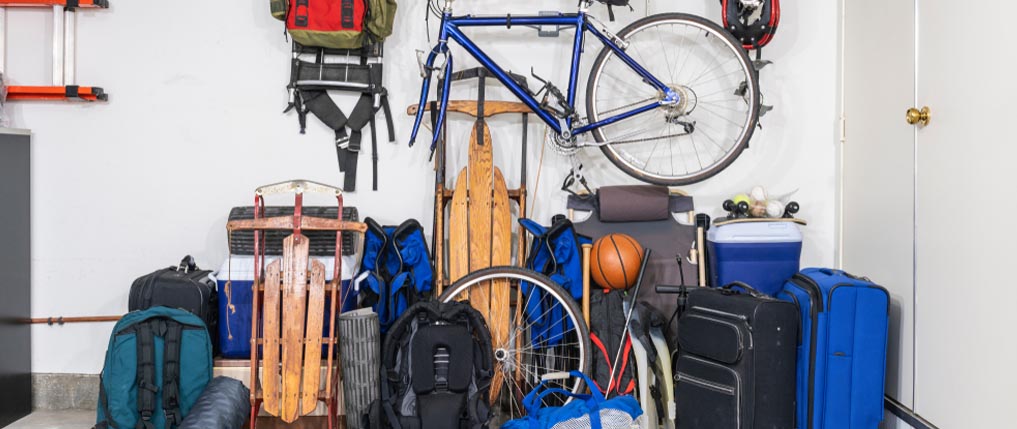5 Tips and Tricks for Storing Camping Gear at Home
July 8, 2021

Camp gear can last for generations, if taken care of properly. If you still have your grandfather’s Coleman lantern, you know what we’re talking about. However, it’s important to take care of your camp gear not only while it’s being used at the site with a few camping storage ideas, but at home, too. Once you return from your weekend or even month-long camping trip, it's a good idea to look things over, repairing leaky tents or broken poles.
But once you have your gear in good shape, how do you store it? Even when it’s not outdoors in the wilderness, camp gear can get damaged from mold, bugs and even dry rot. So what can you do to ensure it lasts as long as possible? Here is a complete guide on camping gear storage solutions.
#1 Create a Storage System
If you’re one to accumulate camp gear or have a large family that requires multiples of everything, do yourself a favor and designate an area in your home for a storage system. Whether you choose to place it in a spare closet or a corner of the garage is entirely up to you. Either way, here are a few camping gear storage system ideas to get you started.
Use Watertight Containers and Bins
Get yourself a few watertight cases that will keep out any moisture that can cause mildew or bugs that might gnaw through materials and create holes. One great advantage of containers and bins is that they can stack vertically, making the most of a garage corner or shelving unit. Also, be sure to label each bin accordingly so you can grab the gear and equipment you need at a moment’s notice. Protective cases are also great for smaller, more sensitive gear. Break up camp gear into categories like kitchen essentials, tarps, technology and hammocks, etc.
Create a Pegboard Wall
If you have extra space in your garage or basement, make a pegboard wall where you can hang camp gear, tools and even add shelves. Pegboards are versatile, inviting you to rearrange as needed when you acquire more gear. Plus, they offer a vertical solution, making the most of compact homes and spaces.
Hang Shelves and Racks
Hanging shelves and racks is a straightforward option. But combine it with watertight bins and you have the perfect camp gear storage solution! Shelves and racks don’t just mean along the walls either — you can hang them from the ceiling, too. Have a cramped garage, but some spare space above the car? Hang a few ceiling-mounted racks to hold gear like kayaks, paddles and fishing rods.
#2 Cover and Hang Camping Chairs

Folding camp chairs can be easily hung on a pegboard wall or stacked against each other on a shelf. However you choose to hang them, make sure to keep them covered with a tarp (even the one you use for your tent’s footprint, if it’s clean). Wrapping or covering them with a tarp can to prevent dust buildup and spiders from making their home between the seats.
#3 Store Tents Dry and Loose
To prevent mold and mildew, tents should be completely dried before storing away. If you have to break down a tent in the rain, pop it back up in the backyard or unfold it on the next clear day so it can dry. Once your tent is good and dry, pack or roll it up loosely in a bag. Also, to avoid condensation or dry rot, never store it in a hot or humid place in your home, like the attic.
#4 Keep Camp Kitchen Items Organized in a Bin
Unless you have the patience and a thorough packing list to remind you what to grab from your home kitchen, keep your camp kitchen gear together in a storage container or bin. Some campers prefer to use a kitchen chuck box, which can be bought or self-made, that keeps utensils, plates, the camp stove and fuel all neat and sorted — but a heavy-duty plastic bin is great, too! For even more consolidation, you can use your camping cooler as kitchen storage after it has been properly cleaned and dried.
#5 Hang Sleeping Bags
The best way to store a sleeping bag is to either hang it or stuff it in a loose sack. While all sleeping bags come with their own compression sack, you don’t want it that tight all through the off-season when it’s not in use. Over time, a sleeping bag can lose its loft, keeping you less warm. If you have an extra closet or pegboard, hang the sleeping bag up. If not, you can stuff it inside a more spacious bag or even a pillowcase
Camping gear should last you a long time-- make sure you store it correctly to extend its lifespan. Keep all your gear organized and dry and, most importantly, ready for your next adventure.

SIGN UP FOR EXCLUSIVE OFFERS
Sign up for our newsletter and get exclusive access to new product launches, special offers and much more.
RELATED BLOGS














